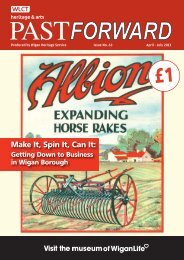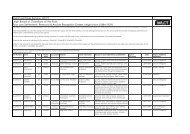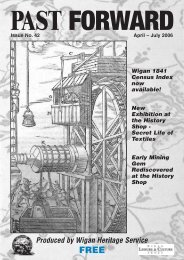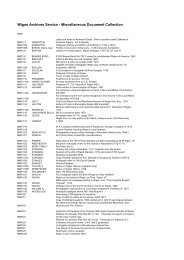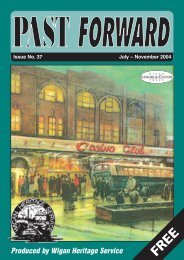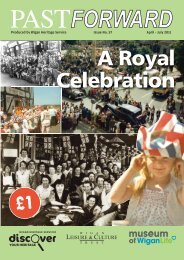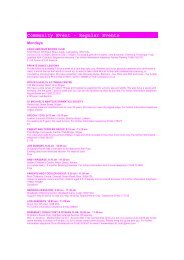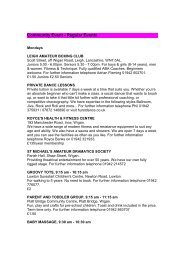Edward Hall Diary Collection
Edward Hall Diary Collection
Edward Hall Diary Collection
- TAGS
- www.wlct.org
Create successful ePaper yourself
Turn your PDF publications into a flip-book with our unique Google optimized e-Paper software.
EHC69/M838 Anonymous <strong>Diary</strong><br />
EHC70/M839 <strong>Diary</strong> of C.H. Lapidge 1827-1829 Domestic Good<br />
EHC71/M840 <strong>Diary</strong> of - Lapidge 1843 Domestic Good<br />
EHC72/M841 <strong>Diary</strong> of Miss Marianne Lapidge<br />
EHC73/M842 Lucy Wright's Notebook<br />
NOT IN THE<br />
COLLECTION No<br />
January 1st - December<br />
21st 1833 Domestic<br />
August 5th - September<br />
6th 1806 Travel Good<br />
EHC74/M843 Anonymous<br />
Domestic/Business<br />
1815 memorandum Good<br />
EHC75/M844 <strong>Diary</strong> of Mrs. Selina Chambers 1786-1801 Domestic Memoranda Good<br />
EHC76/M845 John William's Accounts 1771 Accounts Good<br />
EHC77/M846 <strong>Diary</strong> and Account Book of John Frere 1679-1680<br />
Farming<br />
Accounts/Astrology<br />
EHC78/M847 <strong>Diary</strong> of Miss. Davis 1810 Domestic Spine beginning to weaken.<br />
EHC79/M848 Monsieur Louis Liardon 1795-1812 Memoranda Good<br />
EHC80/M849<br />
Anon. (J.H.) - Journal of a Tour to Eastern<br />
Borders<br />
September 1823<br />
(running narrative) Travel Good<br />
EHC81/M850 Doncaster and Pontefract Poems 1799-1803 Poetry. Good<br />
EHC82/M851 <strong>Diary</strong> of John Foulkes, of Denbigh, Erivet.<br />
EHC83/M852<br />
Log Book of the Steam Paddle Barge<br />
'Kurier' of Berlin<br />
EHC84/M853 <strong>Diary</strong> of Thomas Miller<br />
EHC85/M854 <strong>Diary</strong> of <strong>Edward</strong> <strong>Hall</strong><br />
EHC86,87,88/M854<br />
a, M855, M856 <strong>Diary</strong> of <strong>Edward</strong> <strong>Hall</strong><br />
EHC88, 89/M855,<br />
M856 <strong>Diary</strong> of <strong>Edward</strong> <strong>Hall</strong><br />
EHC90/M857 <strong>Diary</strong> of Joshua Horner<br />
August 30th 1758- June<br />
29th 1769 (no entries<br />
between 1760-68) Farming/Domestic<br />
August 3rd-December<br />
20th 1820s Log Book.<br />
January-September<br />
1861 (irregularly<br />
maintained) Domestic Good<br />
January 1st-August 22nd<br />
1916 First World War Good<br />
January 1924-March<br />
1926 (3 volumes) Domestic Good<br />
December 17th 1934-<br />
April 24th 1935 (written in<br />
black pages of 1926<br />
diary) ; August 4th-<br />
August 9th 1936 (in red<br />
notebook): October 23rd -<br />
November 25th 1937 (in<br />
1926 diary); May 22nd<br />
1938 - January 10th<br />
1939 (in 1926 diary) Domestic Fair<br />
January 1867-December<br />
1868 Domestic/Accounts.<br />
EHC91/M859 (Rev.) Anonymous Good<br />
EHC92/M860 Museum for Gentlemen and Ladies Probably 19th century Teaching text Good<br />
Ex naval officer of Hampton Wick, Middlesex; brother of <strong>Edward</strong> Lapidge,<br />
architect of the new bridge at Kingston-Upon-Thames, and uncle of<br />
Marianne Lapidge. The entries are made in Marshall's Polite Reposotory<br />
for 1827. Most entries in the day-to-day part of the diary are blank, but the<br />
memorandum part is filled. The entries are of a local, domestic nature<br />
concerning activities such as skating and drawing. There is, however, a<br />
mention of the opening of the new Kingston-Upon-Thames bridge on July<br />
17th 1828, the architect of which was his brother, <strong>Edward</strong> Lapidge. Yes<br />
This diary, although written in 1843, is contained in the 'Minor's Pocket<br />
Book for the Youth of Both Sexes, 1828.' The entries are only very<br />
occasional and written in pencil, therefore some are not easily read. The<br />
diaries are made up of very brief notes of social events such as visits,<br />
deaths, illnesses etc. Of possible interest in relation to other Lapidge<br />
diaries. It is not clear, however, which Lapidge wrote the diaries.<br />
Contained in Marshall's Ladies Pocket Engagement Atlas for 1827.<br />
Marianne Lapidge (1818-1902), daughter of <strong>Edward</strong> Lapidge. The diary<br />
No<br />
Some of the pages are has short entries scattered throughout; even so, it is very interesting and<br />
becoming loose, but the outside enjoyable to read. The diary centres on her and her sister Fanny's music<br />
coves are good<br />
lessons with Mr. Williams. No<br />
The diary covers a tour from London to Malvern down through Wales and<br />
the South Coast and Southampton to Cowes on the Isle of Wight where<br />
the diary ends very abruptly. Interesting like a guide book and also on a<br />
personal level. Mentions: Tintern, Chepstow, Levant, Bath, Wells, Taunton,<br />
Exeter, Plymouth, Totnes and Cowes on the Isle of Wight. Yes<br />
Contained in 'Peacock's Polite Repository of Pocket Companion'.<br />
Interesting to economic historians with lots of details about cash<br />
transactions. No<br />
Selina (Innes) Chambers: married daughter of Sir William Chambers,<br />
architect and designer of Somerset House. Contained in the 'Royal<br />
Engagement Pocket Atlas for the year 1779…' Only contains odd bits of<br />
information, e.g. dates of births of children; also speaks of a mortgage of<br />
£10,000. There is more information about this diarist in the Chamses<br />
<strong>Collection</strong> in the Royal Academy. No<br />
Written on the inside page is 'Mr. John Williams at Dainsford, near<br />
Addlestrope, Worcestershire'. He was probably a farmer. The accounts are<br />
contained in 'Harris's Pocket Journal for town and country; or the<br />
gentlemen's memorandum book, for the year 1771. The accounts deal with<br />
domestic matters, servants, farming etc. No<br />
Very badly affected by damp,<br />
It would appear from the diary that John Frere was a farmer, although it is<br />
not clear where his farm was. It is concerned almost entirely with farm<br />
accounts; there are what seems to be leases and legal agreements<br />
transcribed in the diary. The diary is written on the blank pages of the<br />
'News from the Stars; Or an ephemeris for the year 1679. With astrological<br />
judgements upon the several eclipses, positions and configurations of<br />
and also nibbled by mice. heaven, happening therein...By William Andrews, Student in Astrology'.<br />
Some pages very powdery and This printed portion of the diary is concerned with both political and weather<br />
delicate.<br />
predictions for the coming year. It also contains a few advertisements. No<br />
The entries are in the 'Ladies Complete Pocket Book, for the year of out<br />
Lord, 1810'. Miss. Davies lived in Cumberland, possibly near Ambleside.<br />
The entries in her diary are very irregular and are wholly concerned with<br />
domestic and social matters. She shopped quite often in Kendal and in the<br />
summer went to Lytham. The actual pocket book itself is of interest - an<br />
interesting historical point is the inclusion of Henry VII in the House of York<br />
in the list of monarchs at the beginning of the volume. There are also<br />
Enigmas to be solved and a list of fashionable dances for the year 1810. Yes<br />
There is a note on the inside front cover - 'apparently the notebook of one<br />
Louis Liardon, a French footman or valet to Sir Francis Vincent, extending it<br />
would seem from 1795-1812 - E.J. Barron, 1891.' The diary is mostly<br />
composed of jottings and lists to do with Debden <strong>Hall</strong> estate e.g. receipts<br />
for boot blacking, mahogany polish, itineries of tours of England, copies of<br />
poems and epitaphs etc. No<br />
The diary is partly written in pencil so sometimes is difficult to read. A<br />
sentence in the journal seems to sum up its whole feeling - 'I have ever<br />
entertained a string desire to visit everything conspicuous in my country's<br />
history, every memorial of Scotland elderday, and as might be expected<br />
have often turned my attention to the borders...' He continues in such a<br />
vein. The diary centres on visits to Melrose Abbey and Dryburgh. No<br />
Most of the collection appeared in local Doncaster and Pontefract<br />
newspapers. A lot of the poems are written by 'W.E.M.' and 'Henricus',<br />
although some have been copied - e.g. there is a sonnet by Shakespeare. No<br />
Contained in 'The Ladies Almanack, for the year of our Lord 1757'. It goes<br />
on to say that it contains 'New improvements in arts and sciences and<br />
many entertaining particulars; adapted for the use and diversion of the fair<br />
sex' The actual entries in the diary are mostly concerned with farming and<br />
Front cover completely missing; domestic accounts and agreements, all of which are interesting. The farm<br />
back cover completely loose was in North Wales.<br />
Some of the logbook is totally illegible. About one third of it is in German.<br />
The outer pages are dirty and dog-eared. It is a log of voyages between<br />
Hamburg and Berlin, on the 'Kurier' and also on the 'Staat Magdeburg'.<br />
Despite some of the difficulties in reading the handwriting the actual log is<br />
No<br />
Front cover completely loose; of great interest, both historically and because of the personal influences of<br />
back cover completely missing the writer. Yes<br />
Apparently Thomas Miller was a writer of country books for boys - his first<br />
diary entry noted that he has had '40 volumes of various kinds that I have<br />
had written or published'. He writes mostly of his own books; he also writes<br />
of his jaunts in the city. Odd accounts are scattered throughout the diary. No<br />
<strong>Edward</strong> <strong>Hall</strong> kept this diary when he was private and L/Cpl in the 12/15th<br />
Reserves battalion, Yorks and Lancs. regiment, at camps in the north of<br />
England. He really only writes of day-to-day affairs. No<br />
During this period, Mr <strong>Hall</strong> worked for the family firm of Messrs. Qualter,<br />
<strong>Hall</strong> & Co. Ltd., Railway Foundry in Barnsley, Yorkshire. The diary mostly<br />
concerns day-to-day events in the family and firm; it is not of great interest. No<br />
These diaries concern Mr <strong>Hall</strong>'s move from Barnsley to Surbiton and his<br />
career as a second-hand bookseller. It also describes his economic crisis,<br />
and having to go on the Means Test. Mr <strong>Hall</strong> describes the diary as a<br />
'record of spiritual and philosophical struggle, against the background of<br />
economic disaster' No<br />
Good, although the front cover Contained in 'Punch's Pocket Book for 1868' See previous diary of Joshua<br />
has lost its vellum<br />
Horner EHC93/M861<br />
The writing in this diary is almost impossible to read without the use of a<br />
very strong magnifying glass. It seems impossible that someone could<br />
write comfortably in such a microscopic hand. It has been described as a<br />
No<br />
'unique calligraphic item.'<br />
Entitles 'Museum for gentlemen and ladies, or a private tutor for little<br />
masters and misses, containing a variety of useful subjects' The book is<br />
meant to counteract the effects of 'young gentlemen of fortune and quality<br />
so wholly set upon pleasure and diversions' and encourage 'all those<br />
improvements in wisdom and knowledge'. The text makes very interesting<br />
No<br />
reading. No



